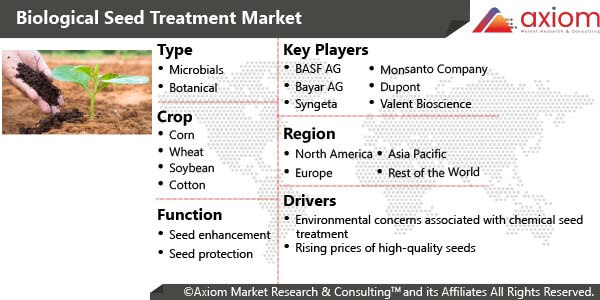Biological seed treatments include the use of natural materials such as plants, bacteria and fungi, for seed treatment method. It provides many benefits to farmers by protecting plants against pests and diseases and increase productivity of the crops. The biological treatment gives a crucial advantage in a critical time window for establishing yield and can contribute to long-term sustainability in agriculture. Commercial farmers are seeking alternatives to highly toxic soil fumigants such as methyl bromide. Moreover, Bayer Crop Science dedicates a multidisciplinary research and development team that focuses solely on biological solutions and plan to strengthening their portfolio by forming collaborations with innovative partners.
The global biological seed treatment is expected to grow at a considerable rate throughout the forecast period, owing to rising world population, increasing food requirement and sustainable agricultural practices. However, limited awareness about biological seed treatment among the farmers and the excessive cost associated with biological seed treatment are major restraining factors hindering the growth of the market. The global biological seed treatment market is mainly classified into type, crop and function.
Based on type, the market is segmented into microbial, botanicals, and others. The microbial segment is further bifurcated into bacteria and fungi others include bio-fermentation products and natural polymers & derivatives. The microbial segment accounted for highest market share in 2017 owing to the factor like comparative cost effectiveness as compared to other commercially available fertilizers. Based on crop, the global biological seed treatment market is categorized into cotton, sunflower, vegetable crops, wheat, corn, soybean and other crops. Others include ornamental crops, fruit, forage, turf, other cereal & oilseed, pulse, and plantation.
In 2017, the corn crop segment accounted for the largest market share in the global biological seed treatment market, owing to its wide range of industrial application in food, feed, and ethanol production. Moreover, the crop is under the risk of getting affected by pathogens, pests, and nematodes are one of the major contributing factors for biological seed treatment. On the basis of function, the global biological seed treatment market is segmented into seed protection and seed enhancement. Seed protection segment is further bifurcated into bio fungicides, bio-insecticides, and others (including bioherbicides and bionematicides). Seed enhancement is also further segmented into bio-fertilizers and bio-stimulants. Moreover, bio-fertilizers segment is estimated to account for a large share of the market in 2017, owing to improving crop quality and the development and commercialization of new types of biofertilizers by key players in the market.
Geographically, the global biological seed treatment market is segmented into key regions, like North America, Europe, Asia Pacific and Rest of the world including Latin America and Middle East & Africa. North America accounted for the largest market share and is anticipated to be fastest-growing region in the biological seed treatment market during the forecast period. North America is followed by Europe and accounted for second-largest market of biological seed treatment. Moreover, Asia-Pacific has been witnessing a sustained demand for seed treatments.
Key competitors of the global biological seed treatment market are Syngenta AG, Bayer Crop Science, BASF SE, Monsanto Company, DuPont.,INCOTEC, Precision Laboratories, LLC, Plant Health Care., Valent BioSciences LLC, Verdesian Life Sciences, LLC. and Groundwork Bio Ag etc. The demands for new products, research & development and collaborations have been the key strategies implemented by market players for global expansion.











